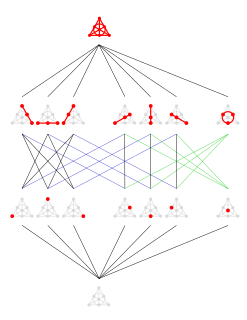
Justice, in its broadest context, includes both the attainment of that which is just and the philosophical discussion of that which is just. The concept of justice is based on numerous fields, and many differing viewpoints and perspectives including the concepts of moral correctness based on ethics, rationality, law, religion, equity and fairness. Often, the general discussion of justice is divided into the realm of social justice as found in philosophy, theology and religion, and, procedural justice as found in the study and application of the law.
In logic, mathematics, and computer science, the arity of a function or operation is the number of arguments or operands that the function takes. In mathematics, arity may also be named rank, but this word can have many other meanings in mathematics. In logic and philosophy, it is also called adicity and degree. In linguistics, it is usually named valency.
In abstract algebra and formal logic, the distributive property of binary operations generalizes the distributive law from Boolean algebra and elementary algebra. In propositional logic, distribution refers to two valid rules of replacement. The rules allow one to reformulate conjunctions and disjunctions within logical proofs.
Distributive justice concerns the socially just allocation of goods. Often contrasted with just process, which is concerned with the administration of law, distributive justice concentrates on outcomes. This subject has been given considerable attention in philosophy and the social sciences. Distributive justice is fundamental to the Catholic Church's social teaching, inspiring such figures as Dorothy Day and Pope John Paul II.
In mathematics, a distributive lattice is a lattice in which the operations of join and meet distribute over each other. The prototypical examples of such structures are collections of sets for which the lattice operations can be given by set union and intersection. Indeed, these lattices of sets describe the scenery completely: every distributive lattice is—up to isomorphism—given as such a lattice of sets.
The distributive-temporal case specifies when and how often something is done.
In the mathematical area of order theory, there are various notions of the common concept of distributivity, applied to the formation of suprema and infima. Most of these apply to partially ordered sets that are at least lattices, but the concept can in fact reasonably be generalized to semilattices as well.

In the mathematical discipline of order theory, a complemented lattice is a bounded lattice, in which every element a has a complement, i.e. an element b satisfying a ∨ b = 1 and a ∧ b = 0. Complements need not be unique.
Distributive shock is a medical condition in which abnormal distribution of blood flow in the smallest blood vessels results in inadequate supply of blood to the body's tissues and organs. It is one of four categories of shock, a condition where there is not enough oxygen-carrying blood to meet the metabolic needs of the cells which make up the body's tissues and organs. Distributive shock is different from the other three categories of shock in that it occurs even though the output of the heart is at or above a normal level. The most common cause is sepsis leading to type of distributive shock called septic shock, a condition that can be fatal.

A determiner, also called determinative, is a word, phrase, or affix that occurs together with a noun or noun phrase and serves to express the reference of that noun or noun phrase in the context. That is, a determiner may indicate whether the noun is referring to a definite or indefinite element of a class, to a closer or more distant element, to an element belonging to a specified person or thing, to a particular number or quantity, etc. Common kinds of determiners include definite and indefinite articles, demonstratives, possessive determiners, quantifiers, distributive determiners, and interrogative determiners (which).
Yabem, or Jabêm, is an Austronesian language of Papua New Guinea.
In linguistics, ordinal numerals or ordinal number words are words representing position or rank in a sequential order; the order may be of size, importance, chronology, and so on. They differ from cardinal numerals, which represent quantity and other types of numerals. In traditional grammar, all numerals, including ordinal numerals, are grouped into a separate part of speech ; however, in modern interpretations of English grammar, ordinal numerals are usually conflated with adjectives.
A distributive pronoun considers members of a group separately, rather than collectively.
Linguistics is the scientific study of language. It involves analysing language form, language meaning, and language in context. Linguists traditionally analyse human language by observing an interplay between sound and meaning.
In linguistics, more precisely in traditional grammar, a cardinal numeral is a part of speech used to count, such as the English words one, two, three, but also compounds, e.g. three hundred and forty-two or three hundred forty-two. Cardinal numbers are classified as definite numerals and are related to ordinal numbers, such as first, second, third, etc.
Fossilized affixes abound in Austronesian languages.
In linguistics, a distributive numeral, or distributive number word, is a word that answers "how many times each?" or "how many at a time?", such as singly or doubly. They are contrasted with multipliers. In English, this part of speech is rarely used and much less recognized than cardinal numbers and ordinal numbers, but it is clearly distinguished and commonly used in Latin and several Romance languages, such as Romanian.
In linguistics, more precisely in traditional grammar, a multiplier is a word that counts how many times its object should be multiplied, such as single or double. They are contrasted with distributive numbers. In English, this part of speech is relatively marginal, and less recognized than cardinal numbers and ordinal numbers.
Lisa Christine Matthewson is Professor of Linguistics in the Department of Linguistics at University of British Columbia with specialties in pragmatics and semantics. She has also done significant work with semantic fieldwork and in the preservation and oral history of First Nations languages, especially St'át'imcets and Gitksan. Matthewson's appointment at UBC was notable because she was the first female full professor in the department's history.
Craige Roberts is an American linguist. Her work in the areas of pragmatics and formal semantics explores how meaning is conveyed through anaphora, definiteness, and specificity of referring expressions, the modeling of presupposition and implicature, and methods for capturing modality, mood, tense, and aspect of verbs in language.


